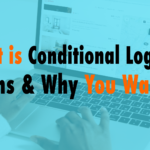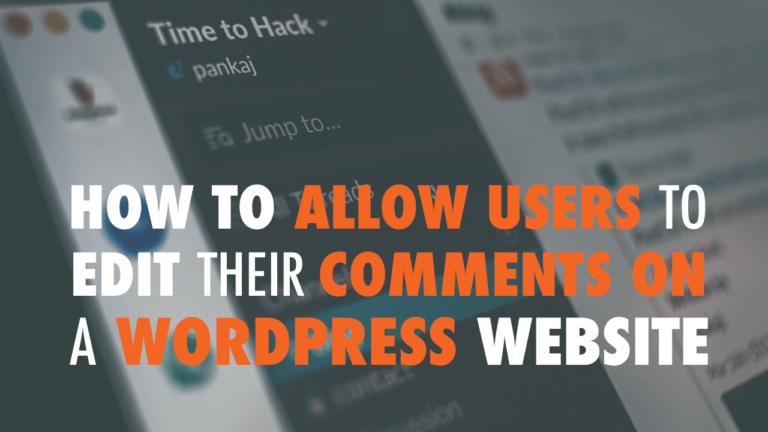What is Conditional Logic in Forms & Why You Want It
Read the full episode transcript below:
00:28 David Blackmon: Welcome to another episode of WP The Podcast, i’m David Blackmon.
00:35 Tim Strifler: And i’m Tim Strifler
00:38 David Blackmon: Today in episode 764 we’re going to talk about conditional logic. And what the heck is it? Informs on a website and why or when you might need it. So before we dive in, this episode is sponsored by WP The Podcast, i’m just kidding might as well have some fun, right?
01:02 Tim Strifler: Yeah there we go, so for those that don’t know conditional logic it’s a, really it’s a programming um method, programming term. Um basically it’s “if this, then that”, right? And so with programming that logic is used like constantly if this happens if this condition is met then, do this action, right? Right, and like that’s generally what programming is and so now we’re not talking about writing code or programming. What we’re talking about is forms but good form plug-ins premium, form plugins will actually have conditional logic built in, where you can you know, if a certain criteria is met, then you can do certain things. And so it makes rather than just a simple like static form you can actually make your forms more dynamic which is really really cool. And so we’re going to share some examples of it, so since i kind of defined what it was. David why don’t you jump in and give some you know an example of of uh…
02:08 David Blackmon: Yeah, i think there’s yeah, i think there are lots of good use cases for when you would want to do conditional logic. I think the first and most important and it’s going to apply to no matter what your reasoning is, but if you have a time or an instance where you want to take a customer through a journey to get specific information from them, it’s a great time to use a conditional logic form. So um i don’t know how to describe it other than making up an example, and for whatever reason real estate is in my brain because years ago we had a real estate company that wanted us to develop a plugin for them, which we did. And my brain just kind of exploded because they were using conditional logic and i felt like it was a great opportunity for user acquisition. So if you wanted to get new customers for example you may have a lead magnet on your website at the top of your website, which is basically a form. It may be like you know find out the value of my home you know, and then they click “okay let me find out what the value of my home is”, and it takes them to a forum and they are starting to answer questions that you’ve already pre-populated, and depending on what their answer is, is going to determine what the next question is. Do you own or rent your own home? Oh i own it, boom it takes them to to a field which may say um you know how many square feet does it have you know um you know and if they chose rent it may kill it all together, because you know or it may take them to a question like “are you interested in buying a home”, you know or i guess the what’s my home value example and rent and own does. It make a lot of sense but you kind of get where i’m going with it and stuff yeah there’s just it’s just a great opportunity go ahead.
04:16 Tim Strifler: Yeah and that’s a great example because that shows how dynamic you can make forms where it’s constantly changing based off of what the user is putting in. Yeah and so it can make these this data collection super powerful, you can get a lot of really good data specifically for that exact person based off, of you know you’re asking questions that’s only relevant to them rather than having all the questions there. And then being like nope not applicable not applicable you know, another i’m sorry go ahead..
04:46 David Blackmon: No, no… you go ahead i was i thought of another example as you were talking but you..
04:52 Tim Strifler: Okay, yeah. So another example could be so like in David’s example, that’s changing the fields. So new questions are coming up based off of the answers to the previous questions in the form, but you could do conditional logic so that it’s the form itself is sent to different departments based off of their input. So say for example, someone says you know the question is like is this a like are you an existing customer or a potential future customer, right. So that it’s like, is it a sales question or is it a support question. Well if it’s a sales question then you can have the the conditional logic automatically route the form to the what did i say as a sales question to the sales department, but if it’s a support question then it goes to the support team based off of how they answer that question. And so it’s not so much changing the form fields based on that question but what happens once they hit submit changes.
05:46 David Blackmon: Absolutely. Another good example of when you may want to use like conditional logic is, if you’re hiring someone. We do it all the time you know, we have a you know do you have any experience in this, you know role that you’re as opposed to a blank form where it’s like, you know your traditional employment application. You can make them very very dynamic. And like Tim says you know you can send it out to wherever you want after the fact put it to the right party hot lead super hot you know. We’re not contacting this not a good, fit whatever it’s just a really really powerful way to use forums on your website, and i think people don’t really realize that that they have that flexibility and ability and and conditional logics has been around wordpress ever since i’ve started with wordpress back in 2013 so almost 10 years ago it was it was in forums, and i still think it’s way under utilized for the power that you actually have. Especially from a marketing standpoint like Tim was talking about the data acquisition. Um you know, when people willingly come and give you input and feedback, man it makes it so much easier for you to close them or sell them if you have all of this knowledge. You’re armed with the facts already and stuff, so yeah don’t underestimate the power of of conditional logic and forms.
07:23 Tim Strifler: Yeah for sure, and another i guess this isn’t a specific example but um most form plug-ins in additional to being able to have conditional logic, also have integrations with third-party software. Right like for example Gravity Forms integrates with help Scout and Slack and Mailchimp and Active Campaign, and get response and um and uh Zapier for even more integrations and stuff. Yeah so you can actually pair integrations with conditional logic to have some really complex automations, so that if a uh user selects a certain answer in the form, it’ll go it’ll do something specific in that integration. Right, so if they they answered the question that like in David’s example, like they’re a homeowner okay well it’s going to tag them as a homeowner in the email marketing software right. And so you can do really cool stuff like that comparing the integrations with conditional logic to do essentially really complex automations without having to touch code which is pretty high.
08:32 David Blackmon: And yeah, and it’s not as complicated as you may think it sounds. It’s pretty simple, if your brain can think of it, if you can literally think of the way that we open this episode, if then then if this then that. So if it if they choose this then show them this, it’s just it’s it’s super easy it’s not it’s not super complex and Tim said no coding or anything it’s just basically clicking buttons and stuff which is you know i love that.
09:07 Tim Strifler: Yeah exactly, but it’s just kind of thinking through those steps, and you know maybe even drawing them out you know with you know a pen and paper of like you know from a high level what happens. You know, that can be a good way to visualize it too. Especially when you’re doing some really complex and there’s a lot going on you know for simple stuff like my example like okay if they suck select this is a sales question go to the sales team okay well that’s pretty self-explanatory you don’t really need to think it through very hard.
09:31 David Blackmon: Right i think we’ve covered it tim are we good?
09:32 Tim Strifler: We are good.
09:35 David Blackmon: Tomorrow we’ve got another great topic in episode 765. We’re gonna tell you where the best place to host videos online is. Until tomorrow we’ll see you then.
09:50 Tim Strifler: Take care, bye.

Did you Enjoy this Episode?
- Will you consider sharing it online? Just click one of the share buttons below!
- Will you leave us a review? 🙂
- Have a question, or a topic request? Let us know in the comments below!
Want to Connect with David & Tim?
- David:
- Tim:








